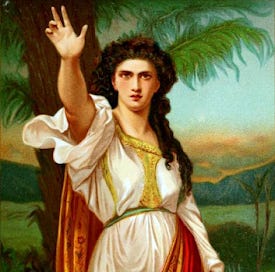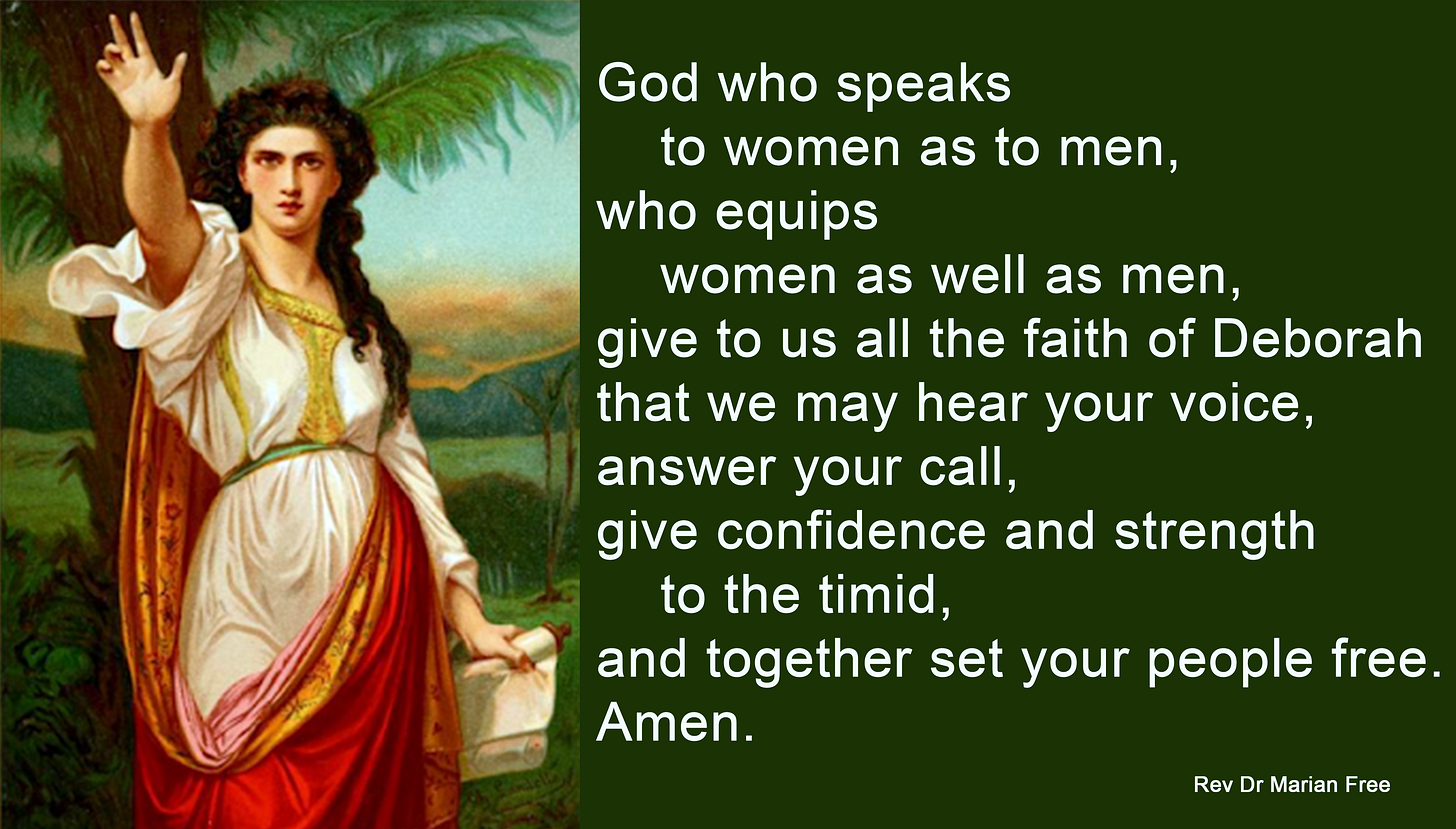Deborah: Judge, Prophet, Warrior, Wife, Mother of Israel, Poet, Singer
Faith of Our Mothers 39
The lack of balance in scripture when it comes to gender is blatantly obvious. More often than not the stories of the leaders, the heroes, the exemplars of faith, and the prophets are men but, perhaps because of the imbalance, men are also depicted as timid, foolish, immoral, and lacking in trust. In contrast, the women who are represented in scripture stand out, not only because they are significant enough to warrant a mention, but also because they are courageous, faithful, resourceful and intrepid – sometimes exposing the weakness or fearfulness of their male counterparts.
Such is the case of Deborah.
We meet Deborah in the book of Judges, the account of colonization of Canaan by the Israelites (or the record of the entry into the promised land). After forty years in the wilderness and the death of Moses, Joshua, led by God, leads the twelve tribes of Israel into the promised land where they defeat all the inhabitants of the land (Judges 1). However, when Joshua and all of his generation die, the people forget all that God has done for them and begin to do evil and to worship the local gods. As a consequence, God allows them to be plundered by their neighbours (Judges 2). Without God’s help they cannot withstand their enemies.
God, who never totally abandons God’s people, raises up judges to deliver the Israelites from their enemies, but whenever a judge dies they quickly revert to their former ways. During this early period God raises up Othniel, Ehud and Shamgar who deliver Israel from the hands of their oppressors, but at the death of each, the Israelites relapse once more.
It is difficult from the text to develop a time frame, but after the death of Ehud, we are told that “the Lord sold them into the hand of King Jabin of Canaan, who reigned in Hazor; the commander of his army was Sisera, who lived in Harosheth-ha-goiim. Then the Israelites cried out to the LORD for help; for he had nine hundred chariots of iron, and had oppressed the Israelites cruelly twenty years” (Judges 4:2-3).
At this point God raises up another judge, Deborah: a woman, wife of Lappidoth[1]. Deborah is the only woman to be named a judge and the only judge to also be a prophet, a warrior, a mother, a poet and a singer. Deborah is one of only five women to be named as prophets and so far as we know the only judge to whom people from all over Israel come for advice and judgement.
Important to, and as a foil to the story of Deborah, is Barak. At this time Barak is a leader of the tribe of Naphtali one of the smallest of the 12 tribes of Israel. Deborah informs Barak that God has commanded him to raise an army to fight Sisera, leader of the Canaanite army. Barak is assured of success, for God will give Sisera into his hand (4:7). For reasons that are not explained Barak insists that he will only go into battle if Deborah goes with him. Even though Deborah warns that because of his lack of courage, the ultimate victory and subsequent honour will go to a woman (Jael, not Deborah), Barak is not dissuaded.
Deborah returns to Barak’s home and when he has raised his army she goes into battle with him. Sisera’s army is indeed routed, “no one is left”. Sisera himself flees to his allies where he seeks refuge with Jael, the wife of Heber the Kenite. But Jael deceives him and while he sleeps, she drives a tent peg right through his head.
Barak may have led his army, and defeated Sisera’s army but it is Deborah’s obedience and courage, that gives him the nerve to obey God’s command, and it is Jael’s cunning that secures the ultimate victory.
The song of victory which follows names Deborah as “mother of Israel”, but despite’s Barak’s timidity, the song gives credit to him and to all the leaders of the clans of Israel. That Deborah and Jael even get a mention is a reminder that they stood out, not only among women, but from all the tribes of Israel.
Following the defeat of Sisera, Israel lived in peace for forty years and the peasants prospered.
So let’s pray:
God who speaks to women as to men, who equips women as well as men, give to us all the faith of Deborah that we may hear your voice, answer your call, give confidence and strength to the timid, and together set your people free. Amen.
Rev Dr Marian Free is a wife, mother, grandmother, priest and lecturer. A life-long Anglican, Marian is old enough to remember the many ways in which women were excluded from public life and from roles in the church, to have felt alienated and made invisible by the language and in the stories. She was a founding co-ordinator of MOW Brisbane and among the third group of women to be ordained as priest. Marian has served as Priest In Charge in Rosewood, Toowong and Hamilton and has lectured at St Francis’ College for most of her ministry.
[1] Nothing is known of Lappidoth, and it is not clear why Deborah needs this identification, though readers at the time may have been able to identify the tribe from which she came.






Thank you Marian for your words and enlightenment of the role of Deborah. It is important for me to begin and continue to hear about the roles of Women--the faith of our mothers. I have learnt so much as I hear these stories and have the truth revealed of just how important these courageous and faith driven women played in God's coming among us. God bless you and your ministry
Thank you Marian, and also for Lot’s wife.